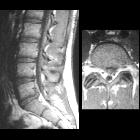denervation changes in muscles

Einseitige
fettige Muskelatrophie Unterschenkel. Ursache unklar, z.B. Denervation. Rechts intramuskulär noch kleines Lipom.

Denervation
changes in muscles • Parsonage Turner syndrome - Ganzer Fall bei Radiopaedia

Quadrangular
space syndrome • Quadrilateral space syndrome - Ganzer Fall bei Radiopaedia

Denervation
changes in muscles • Suprascapular neuropathy- paralabral cyst - Ganzer Fall bei Radiopaedia

Denervation
changes in muscles • Denervation atrophy - Ganzer Fall bei Radiopaedia

Fettige
Atrophie der autochthonen Rückenmuskulatur: Vergleiche die Signalintensität mit dem M. psoas. Links axial, rechts sagittal durch den M. psoas.
Denervation changes in muscles or denervation myopathy can be observed in a number of settings and results from partial or complete loss of innervation.
There is a wide spectrum of clinical manifestations:
- temporary or permanent
- symptomatic or asymptomatic.
Pathology
Causes include :
- neuropathy
- autoimmune disorders
- viral infection
- prolonged nerve compression
- nerve infiltration by neoplasm
- penetrating injury
- Parsonage-Turner syndrome
Radiographic features
MRI
In the very early stage, muscle signal may be normal.
Acute denervation
- the earliest and most pathognomonic feature is increased T2 signal (best seen on a fat-saturated T2WI such as STIR) representing muscle edema
- normal muscle contrast enhancement
- muscle bulk is normal
- causative lesions may be apparent such as:
- tumor compressing or displacing the neurovascular bundle
- nerve discontinuity due to penetrating trauma
Subacute and chronic denervation
- features are less specific
- muscle atrophy and fatty infiltration with an increase in T1 signal
- heterogeneous edema-like signal
See also
Siehe auch:
- T2 weighted image
- lipomatöse Atrophie
- Diskusprolaps
- STIR - short tau inversion recovery
- quadrilateral space syndrome
- diabetische Myonekrose
- Muskelödem
- Muskelatrophie
- Atrophie nach Entlastung
und weiter:

 Assoziationen und Differentialdiagnosen zu Muskelveränderungen bei Denervation:
Assoziationen und Differentialdiagnosen zu Muskelveränderungen bei Denervation:



